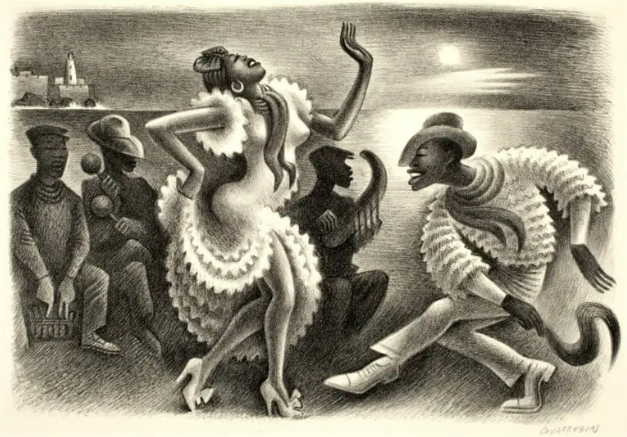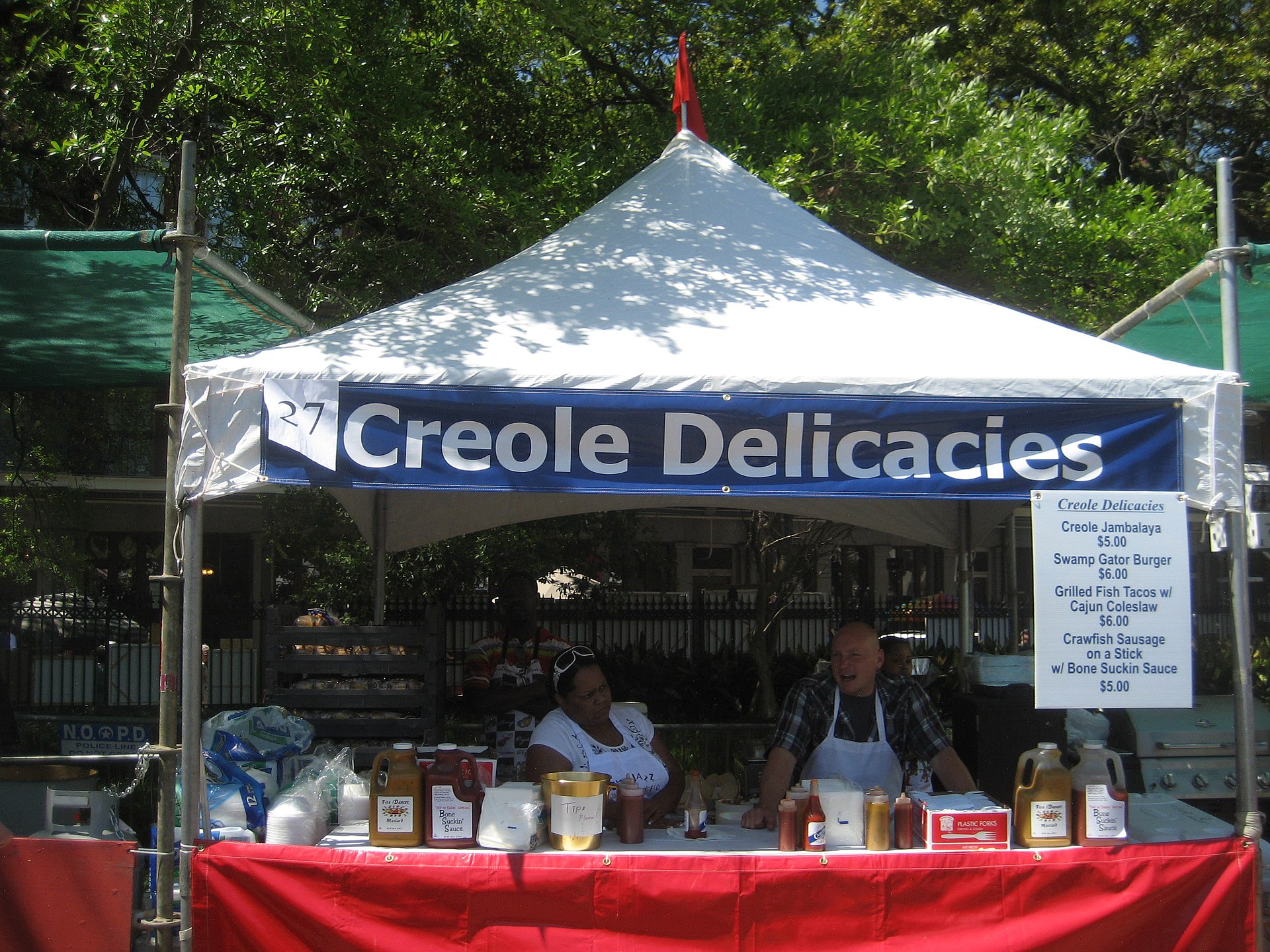
クレオール化・クレオライゼーション
Creolization
Miguel Covarrubias, Rumba, 1945, Madison Museum of Contemporary Art
☆
クレオール化(Creolization)
とは、クレオール言語やクレオール文化が出現する過程のことである[1]。クレオール化は言語学者によって、接触言語がどのようにしてクレオール言語にな
るのかを説明するために使われたのが始まりであるが、現在では他の社会科学の学者も、社会間の接触や移転した民族によってもたらされた新しい文化表現を説
明するためにこの用語を使用している[2]。
[2]クレオール化は伝統的にカリブ海諸国を指す言葉として使われてきたが、カリブ海諸国だけに限ったことではなく、他のディアスポラを表す言葉として使
う学者もいる。社会学者のロビン・コーエンは、クレオール化は「参加者が流入する文化や継承される文化から特定の要素を選択し、それらに元の文化で持って
いたものとは異なる意味を付与し、それらを創造的に融合させ、以前の形態に取って代わる新たな品種を創造する」ときに起こると書いている[4]。
| Creolization
is the process through which creole languages and cultures emerge.[1]
Creolization was first used by linguists to explain how contact
languages become creole languages, but now scholars in other social
sciences use the term to describe new cultural expressions brought
about by contact between societies and relocated peoples.[2]
Creolization is traditionally used to refer to the Caribbean, although
it is not exclusive to the Caribbean and some scholars use the term to
represent other diasporas.[3] Furthermore, creolization occurs when
participants select cultural elements that may become part of inherited
culture. Sociologist Robin Cohen writes that creolization occurs when
“participants select particular elements from incoming or inherited
cultures, endow these with meanings different from those they possessed
in the original cultures, and then creatively merge these to create new
varieties that supersede the prior forms.”[4] |
ク
レオール化とは、クレオール言語やクレオール文化が出現する過程のことである[1]。クレオール化は言語学者によって、接触言語がどのようにしてクレオー
ル言語になるのかを説明するために使われたのが始まりであるが、現在では他の社会科学の学者も、社会間の接触や移転した民族によってもたらされた新しい文
化表現を説明するためにこの用語を使用している[2]。
[2]クレオール化は伝統的にカリブ海諸国を指す言葉として使われてきたが、カリブ海諸国だけに限ったことではなく、他のディアスポラを表す言葉として使
う学者もいる。社会学者のロビン・コーエンは、クレオール化は「参加者が流入する文化や継承される文化から特定の要素を選択し、それらに元の文化で持って
いたものとは異なる意味を付与し、それらを創造的に融合させ、以前の形態に取って代わる新たな品種を創造する」ときに起こると書いている[4]。 |
| Beginning According to Charles Stewart,[5] the concept of creolization originates during the 16th century, although there is no date recording the beginning of the word creolization. The term creolization was understood to be a distinction between those individuals born in the "Old World" versus the New World.[5] As consequence to slavery and the different power relations between different races creolization became synonymous with Creole, often of which was used to distinguish the master and the slave. The word Creole was also used to distinguish those Afro-descendants who were born in the New World in comparison to African-born slaves.[5] The word creolization has evolved and changed to have different meaning at different times in history. What has not changed through the course of time is the context in which Creole has been used. It has been associated with cultural mixtures of African, European, and indigenous (in addition to other lineages in different locations) ancestry (e.g. Caribbeans).[3] Creole has pertained to "African-diasporic geographical and historical specificity".[3] With globalization, creolization has undergone a "remapping of worlds regions",[3] or as Orlando Patterson would explain, "the creation of wholly new cultural forms in the transnational space, such as 'New Yorican' and Miami Spanish". Today, creolization refers to this mixture of different people and different cultures that merge to become one. |
始まり チャールズ・スチュワートによると[5]、クレオリゼーションの概念は16世紀に生まれたとされているが、クレオリゼーションという言葉が始まったという 日付は記録されていない。クレオライゼーションという用語は、「旧世界」で生まれた個人と新世界で生まれた個人を区別するものと理解されていた[5]。奴 隷制度と異なる人種間の力関係の結果として、クレオライゼーションはクレオールと同義語となり、しばしば主人と奴隷を区別するために使用された。クレオー ルという言葉は、アフリカ生まれの奴隷と比較して、新世界で生まれたアフロ系子孫を区別するためにも使われた。 クレオール化という言葉は、歴史上、時代によって異なる意味に変化してきた。クレオールとは、アフリカ系、ヨーロッパ系、先住民系(カリブ系など)の文化 的混血と関連付けられてきた[3]。 [3]グローバリゼーションに伴い、クレオール化は「世界地域の再マッピング」[3]、あるいはオーランド・パターソンが説明するように「『ニューヨリカ ン』やマイアミ・スパニッシュのような、トランスナショナルな空間における全く新しい文化形態の創造」を経てきた。今日、クレオリゼーションとは、このよ うに異なる人々や異なる文化が混ざり合い、ひとつになることを指す。 |
| Diaspora Creolization as a relational process can enable new forms of identity formation and processes of communal enrichment through pacific intermixtures and aggregations, but its uneven dynamics remain a factor to consider whether in the context of colonization or globalization.[6] The meeting points of multiple diasporas and the crossing and intersection of diasporas are sites of new creolizations.[3] New sites of creolizations continue the ongoing ethics of the sharing of the world that has now become a global discourse which is rooted in English and French Caribbean. The cultural fusion and hybridization of new diasporas surfaces and creates new forms of creolization. |
ディアスポラ 関係性のプロセスとしてのクレオール化は、新しい形のアイデンティティ形成や、太平洋的な相互混合や集合体を通じた共同体の豊かさのプロセスを可能にする が、その不均等な力学は、植民地化の文脈であれグローバル化の文脈であれ、考慮すべき要因であり続けている[6]。複数のディアスポラの出会いの場や、 ディアスポラの交差点や交差点は、新しいクレオール化の場である[3]。新しいクレオール化の場は、英語とフレンチカリブ海に根ざしたグローバルな言説と なった世界の共有という現在進行形の倫理を続けている。新たなディアスポラの文化的融合とハイブリッド化は、クレオリゼーションの新たな形態を表面化さ せ、創造する。 |
| Culture There are different processes of creolization have shaped and reshaped the different forms of one culture. For example, food, music, and religion have been impacted by the creolization of today's world. Food  Creole Delicacies Food Booth in Louisiana Creolization has affected the elements and traditions of food. The blend of cooking that describes the mixture of African and French elements in the American South, particularly in Louisiana, and in the French Caribbean have been influenced by creolization. This mixture has led to the unique combination of cultures that led to cuisine of creolization, better known as creole cooking.[7] These very creations of different flavors particularly pertain to a specific territory which is influenced by different histories and experiences. The Caribbean has been colonized under a multitude of different countries which influenced the creation of new and different recipes as well as the implementation of new cooking methods. Creole cooking pulls heavily from French and Spanish influences due to their colonization in the 1600s through the mid to late 1900s. They also draw influence from their African roots and a different mixture of Native American tribe cooking methods.[8] Music To some degree, most forms of music considered "popular" came from the oppression of a people or slavery. This cross-fertilization triggers a cultural blending and creates a completely different form of its own through the turmoil and conflict of the dominating and dominated culture.[9] One such form of this is jazz music. The work of art music created by African diaspora composers frequently exhibits this as well.[10] Jazz music took its roots from the dialogue between black folk music in the U.S., that is derived from plantations and rural areas and black music based in urban New Orleans. Jazz music developed from the creole music that takes its roots from the combination of blues, parlour music, opera, and spiritual music.[7] Religion The popular religions of Haiti, Cuba, Trinidad, and Brazil formed from the mixing of African and European elements. Catholicism came with the European colonization of the Caribbean, which led to the heavy influence of its practices upon the already existing religion.[11] Religious beliefs such as Vaudou in Haiti, Santeria in Cuba, Shango in Trinidad, and Candomblé in Brazil take its roots from creolization. The creation of these new religious expressions have sustained and evolved over time to make creole religions.[7] A related concept to creolization is called "cultural additivity".[12] |
文化 クレオリゼーションのさまざまなプロセスが、ひとつの文化のさまざまな形を形成し、再構築してきた。例えば、食べ物、音楽、宗教は今日のクレオール化の影響を受けている。 食べ物  ルイジアナ州のクレオール料理フードブース クレオール化は食の要素や伝統に影響を与えている。アメリカ南部、特にルイジアナ州やカリブ海のフランス料理では、アフリカとフランスの要素が混ざり合っ た料理がクレオール化の影響を受けている。この混合は、クレオール料理としてよりよく知られているクレオール化の料理につながった文化のユニークな組み合 わせにつながった[7]。これらの異なる味の非常に創造は、特に異なる歴史と経験の影響を受けている特定の領土に関連する。カリブ海は多くの異なる国の植 民地となり、新しいレシピの創造や新しい調理法の導入に影響を与えた。クレオール料理は、1600年代から1900年代半ばにかけて植民地化されたフラン スとスペインの影響を強く受けている。また、アフリカのルーツやネイティブ・アメリカン部族の調理法の異なる混合物からも影響を受けている[8]。 音楽 ある程度、「ポピュラー」とされる音楽のほとんどの形態は、民族の抑圧や奴隷制度から生まれたものである。この異種交配は文化の融合を引き起こし、支配す る文化と支配される文化の混乱と対立を通じて、まったく異なる独自の形態を生み出す[9]。そのような形態のひとつがジャズ音楽である。アフリカ系ディア スポラの作曲家たちによって創作された芸術音楽の作品にも、このような傾向がよく見られる[10]。 ジャズ音楽のルーツは、プランテーションや農村地域に由来するアメリカの黒人民俗音楽と、ニューオーリンズの都市部を拠点とする黒人音楽との対話にある。 ジャズ音楽は、ブルース、パーラーミュージック、オペラ、スピリチュアルミュージックの組み合わせにルーツを持つクレオール音楽から発展した[7]。 宗教 ハイチ、キューバ、トリニダード、ブラジルの大衆宗教は、アフリカとヨーロッパの要素がミックスされて形成された。ハイチではヴォードゥ、キューバではサ ンテリア、トリニダードではシャンゴ、ブラジルではカンドンブレといった宗教がクレオール化によって生まれた。これらの新しい宗教的表現の創造は、クレ オール宗教を作るために時間をかけて持続し、進化してきた[7]。 |
| Creole nationalism Creole language Hybridity Creole peoples Créolité Creole cuisine |
クレオール・ナショナリズム クレオール語 ハイブリディティ クレオール民族 クレオリテ クレオール料理 |
| https://en.wikipedia.org/wiki/Creolization |
|
リ ンク
文 献
そ の他の情報
Copyleft, CC, Mitzub'ixi Quq Chi'j, 1996-2099
☆
 ☆
☆